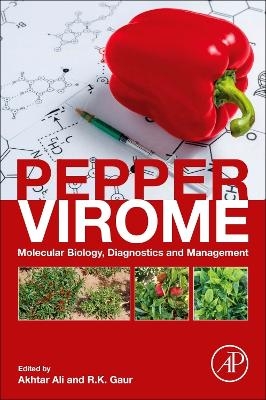
Pepper Virome
Academic Press Inc (Verlag)
978-0-443-15576-5 (ISBN)
Professor (Dr.) Akhtar Ali earned his PhD (1994–1999) in plant virology from the University of Adelaide, Australia, and is now a professor at the Department of Biological Sciences, The University of Tulsa (TU), Oklahoma, USA. He has held several postdoctoral positions in plant virology at the Tohoku Agricultural Research Center (TARC), Morioka, Japan (1999–2001), at the CSIRO in Adelaide, Australia (2002–2004), and at the Sam Robert Noble Research Institute in Ardmore, Oklahoma, USA (2004–2007). In 2007, he joined the University of Tulsa as an assistant professor and was promoted to associate professor in 2012 and full professor in 2020. In 2017, Dr. Ali was awarded a US Fulbright Fellowship at the University of Okayama and worked on mycoviruses. His courses cover everything from human disease to plants, and he developed and taught several courses (Experimental Techniques in Molecular Biology, Introduction to Virology, and Biology of Cancer) to both undergraduate and graduate students. His research interests include virus evolution, genetic bottlenecks, epidemiology, and the molecular characterization of plants and mycoviruses in various agricultural crops. He has supervised >20 PhD/MS students, published over 100 scientific papers, 12 book chapters, and presented 22 papers at international and 85 papers at various national conferences. Dr. Ali served as an editor for several international journals, such as Plant Disease, PhytoFrontier, Pathogens, PLOS One, and Frontiers in Virology and Microbiology. In 2023, Dr. Ali was awarded the Zelimir Schmidt Award for Outstanding Researcher by the College of Engineering and Natural Science at the University of Tulsa. Prof. (Dr.) R.K. Gaur earned his Ph.D. in 2005, and is now a Professor at the Department of Biotechnology, Deen Dayal Upadhyaya Gorakhpur University, Gorakhpur, Uttar Pradesh, India. His Ph.D. was on the molecular characterization of sugarcane viruses, i.e., mosaic, streak mosaic, and yellow luteovirus. He received a MASHAV fellowship of the Israeli government for his postdoctoral studies and joined The Volcani Center, Israel and Ben-Gurion University, Negev, Israel. In 2007 he received the Visiting Scientist Fellowship from the Swedish Institute, Sweden to work at Umea° University, Umea°, Sweden. He received a postdoc fellowship from ICGEB, Italy in 2008. He has made significant contributions on sugarcane viruses and has pub lished 130 national/international papers, authored 17 edited books and presented about 50 papers at national and international conferences. He has been honored as a Fellow of Linnean Society, a Fellow of the Royal Society of Biology, a Fellow of the Society of Plant Research, a Fellow of the Society of Applied Biology (FSAB), and a Fellow of the International Society of Biotechnology (FISBT). He has received many other awards, including the Prof. B.M. Johri memorial Award, Society of Plant Research (SPR); Excellent Teaching Award by Astha Foundation, Meerut; UGC-Research Teacher Award; Young Scientist Award in 2012 in Biotechnology by the Society of Plant Research (SPR), Meerut; and Scientific and Applied Research Center Gold Medal Award in 2011 for outstanding contribution in the field of Biotechnology. He has visited several laborato ries in the United States, Canada, New Zealand, United Kingdom, Thailand, Sweden, and Italy. Currently, he is han dling many national and international grants and international collaborative projects on plant viruses and disease management
1. Capsicum genomics and biotechnology/genetics Section-I: Diversity 2. Pepper virome diversity and its ecological implications 3. Diagnosis, genetic diversity and molecular characterization of geminiviruses infecting pepper 4. Interactions between bell pepper endornavirus and the host 5. Pepper viruses: agricultural threats turned effective tools with varied biotechnological applications Section-II: Evolution 6. Overview of RNA viruses infecting Capsicum species 7. Interactome of Pepper-pepper infecting viruses 8. An update on the polerovirus-induced pepper yellow disease 9. A global scenario of Capsicum-infecting DNA viruses 10. Chilli leaf curl virus: an emerging threat to our current vegetable production 11. An updated account on the pepper-begomovirus interplay: A never-ending physiological warfare Section III: Transmission and Management 12. Seed transmission of pepper viruses: what is known and what is not 13. Thrips as the vectors of Tospoviruses associated with Chili 14. Virus-vector interactions and transmission 15. Virus, viroid and nematode interactions 16. Virus Management: Traditional and Modern 17. Characterization and management of economically important viruses on sweet pepper cultivars in Europe 18. Chilli Leaf Curl Disease: Status and Strategies for Sustainable Management
| Erscheinungsdatum | 27.04.2024 |
|---|---|
| Verlagsort | San Diego |
| Sprache | englisch |
| Maße | 152 x 229 mm |
| Gewicht | 840 g |
| Themenwelt | Naturwissenschaften ► Biologie ► Botanik |
| Weitere Fachgebiete ► Land- / Forstwirtschaft / Fischerei | |
| ISBN-10 | 0-443-15576-3 / 0443155763 |
| ISBN-13 | 978-0-443-15576-5 / 9780443155765 |
| Zustand | Neuware |
| Informationen gemäß Produktsicherheitsverordnung (GPSR) | |
| Haben Sie eine Frage zum Produkt? |
aus dem Bereich


